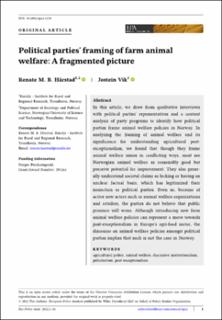| dc.contributor.author | Hårstad, Renate Marie Butli | |
| dc.contributor.author | Vik, Jostein | |
| dc.date.accessioned | 2022-08-31T07:12:45Z | |
| dc.date.available | 2022-08-31T07:12:45Z | |
| dc.date.created | 2022-08-29T10:50:21Z | |
| dc.date.issued | 2022 | |
| dc.identifier.issn | 2380-6567 | |
| dc.identifier.uri | https://hdl.handle.net/11250/3014591 | |
| dc.description.abstract | In this article, we draw from qualitative interviews with political parties' representatives and a content analysis of party programs to identify how political parties frame animal welfare policies in Norway. In analyzing the framing of animal welfare and its significance for understanding agricultural post-exceptionalism, we found that though they frame animal welfare issues in conflicting ways, most see Norwegian animal welfare as reasonably good but perceive potential for improvement. They also generally understand societal claims as lacking or having an unclear factual basis, which has legitimized their nonaction as political parties. Even so, because of active new actors such as animal welfare organizations and retailers, the parties do not believe that public pressure will wane. Although introducing new farm animal welfare policies can represent a move towards post-exceptionalism in Europe's agri-food sector, the discourse on animal welfare policies amongst political parties implies that such is not the case in Norway. | |
| dc.description.abstract | Political parties' framing of farm animal welfare: A fragmented picture | |
| dc.language.iso | eng | |
| dc.title | Political parties' framing of farm animal welfare: A fragmented picture | |
| dc.title.alternative | Political parties' framing of farm animal welfare: A fragmented picture | |
| dc.type | Peer reviewed | |
| dc.type | Journal article | |
| dc.description.version | publishedVersion | |
| dc.source.journal | European Policy Analysis | |
| dc.identifier.doi | 10.1002/epa2.1154 | |
| dc.identifier.cristin | 2046608 | |
| cristin.ispublished | true | |
| cristin.fulltext | original | |
| cristin.qualitycode | 1 | |
